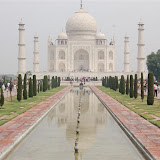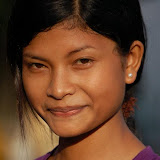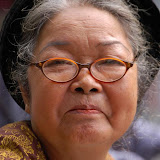living in a foreign country for almost 5 years gives you the opportunity to question your own country is many ways. the things you take for granted, because you culturally share them with friends and family, are rarely the same for those who are around you day to day. social beliefs come from many sources; the words of politicians and preachers, the spin of news and the fiction in books. but the most powerful for me is the stories and characters in movies. i find that cultures are driven by their icons, which has me thinking about my adopted home.
there is a new restaurant in bangsar village called "plan-b". as the name suggests there is almost nothing new about the place. the menu and management team were both stolen from delicious when the owners sold that successful chain to the E&O hotel group. possbily to make it less of a direct copy, this time the color scheme is black, and the staff is mostly local; neither of which is a positive change. the only improvement to the place is the showing of "p. ramlee" movies running silently on large screens at the back of the house.
as i was waiting for the worst service i ever, the movies gave me a chance to consider how much malaysia has changed since the 60s. the women in the film were uncovered and tightly wrapped in kebaya, some of the most beautiful women i have seen here. the subtitles helped me follow along with the plot, which seemed to have three paths:
- the splitting up of a fathers estate among brothers that smiled at each other but all wanted more than they got
- the failure of a one of the brothers businesses
- the attempt to marry three daughters off to a rich business associate in an attempt to avoid admitting failure publicly
using movies from the same period as the ramlee films, i would point to john wayne as the typical american icon. films with wayne as a strong leader, almost always a self starter and independent man. one who fought for what was right, and would always win. later films, like true grit the recently remade classic, showed that he understood he was aging, but that the world still needed men with grit. riding tall in the saddle, blocking the way of a larger group and speaking clearly with "bold talk for a one-eyed fat man" was the example being set.
a more modern example of the same american character is jason bourne. a man put into a situation that he does not completely understand, but that he finds he has the skills to react to. bourne represents a bit of the europeanization of the american phyche, more educated and nuanced than any character wayne played, but always capable. early in the series, bourne even shows how surprised he is at the things he can do when he is forced. americans have learned that sometimes they are forced into action, but much like the old john wayne films are still expected to succeed.
another example of this is the "die hard" character john mcclane. mcclane is an average guy, when we meet him he is picked up at the airport by a chauffeur he did not expect and driven to the holiday party of his estranged wife's company. she is an executive, he is a police sargent and they live 3,000 miles apart, this is a man whose life has taken turns he did not expect. as the film unfolds we find that "only john can drive someone that crazy". he is difficult to live with, has a big mouth and enjoys annoying people, but is also the guy you want on your side in a fight. mcclane, like bourne, takes enormous punishment through the film and keeps going. stopping is not an option; being tired and bloody, but continuing on is what makes him "that guy". he could stop, but no one else is there to do the job.
i asked an american friend about this the other day, who did he see as the amercian icon in film. he quickly said, bill murray in stripes. the movie is about a guy who loses his job, his car, his apartment and his girlfriend all in one day, so he joins the army. this is not an action film, it's a comedy about being a wise ass, having the freedom to be oneself even when you are forced to fit into a community you do not naturally belong. but even in this film, the character is forced into action and takes leadership of the unit, steals an armored RV and invades czechoslovakia to save friends who have strayed into trouble. another hero, clearly one we did not expect at the beginning.
as i look over this list, it reenforces the idea that american films teach that the community must succeed. culture says we must be ready for action (even if we did not want it), we can get the crap beat out of us, but we will win if we keep going. we expect to win because we learn to not give up at the first sign of tough times. in almost all of these films, the hero is working against those in power, or are getting less than the support expected. needing to be self sufficient is also part of that beaten up and bloodied american psyche. which brings me back to malaysian film icons.
i did some reading on p. ramlee after watching the silent movie. he lived the end of his life in singapore. towards the end he was the butt of jokes, and considered a has-been and was rejected by malaysia. after an untimely death in 1973 the malaysian community waited 9 years to rename a street for him, and another 8 after that to award an honorary title of "tan sri". he is now a caricature that silently runs in a restaurant with horrible service. i am not sure what he represents to the malaysian community and what his films say about the culture or the community as a whole.
i want to understand, but locals have not been willing or able to tell me. to be fair, i just asked one more time, trying to get an answer before assuming that the country really does not have an inner message. i turned to an available malaysian and explained my question, when asked who is the film icon for the country he quickly said "p. ramlee", when asked what the films said to malaysia, he replied:
"i don't know, i have never watched one"











In my opinion, P.Ramlee is selected as an icon because of this multi-talented in film industry. He was an actor, director, producer, singer, composer etc.
ReplyDeleteI have watched his movies for many times and notice that the moral values contain in a movie are delivered indirectly to the audiences. You might to understand the local community beliefs, cultures and lifestyles not only at the upon of time the films are made. This helps to extract the moral values from a film. A film has its own target audiences. I believe in P.Ramlee's case the local people are the main target audiences.
Mostly, his scripts were written very symboli which portrays the eartern community cultures and beliefs e.g the typical eastern community is known for their shyness so they use words as a weapon to tell a story instead of an action. That is why his movies must have singing as part of the scenes to express feelings.
Seeing things in different angles might help you to understand as well. A good quality storyline does not necessarily written a true story of the local cultures at times. It needs to add a little element of fantansy, actions to deliver a message. It is just like when you cook a recipe. Sprinkle of salt, black peppers and sugar are needed to add more tastes in your foods. The impacts to the audience really depends on how much it has captured the attention in the cinema or tv stations. The showing duration is one of the successful factors for a film too.
As everyone knows, P.Ramlee's creative works have been honored and inspired locally and internationally. When there is an honor, there must be something valueble contributed to the people or country :-)
the strength of P Ramlee's movies was the dialog and the way it was presented. Which the substittle didn't do justice. He also captured the actual life in that era and poke fun at it, as well as criticizing the social prejudice at the time. Example of one of his good movie was Sarjan Hassan. About a guy who was a no body but because he loves the country and fight for the right reason, he becomes a hero in the end. I guess what he's trying to say, shit happen everyday and we're not perfect but in spite it all life must go on.
ReplyDeleteanyway, I'm reading about the revolution in the middle east. I think the arabs finally realized that they were being screwed in the ass by their leader and now they want to toppled the government. this is a healthy progress eventho i wish that it doesn't involved violence and casualties. maybe next time you should write about these revolutions (and how quickly the nervous PM urge Malaysians not to do the same here haha!)